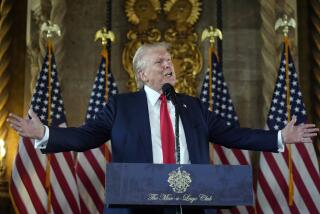Editorial: Manafort convictions show Mueller’s probe is no ‘witch hunt.’ But Cohen’s plea is what Trump should fear
In finding former Trump campaign Chairman Paul Manafort guilty of serious financial crimes, a federal jury on Tuesday not only ratified much of the case offered by prosecutors in a complicated trial; it also made it harder for President Trump to discredit the larger investigation being conducted by Special Counsel Robert S. Mueller III. This was no “witch hunt.”
After being presented with voluminous evidence and testimony about the tens of millions of dollars Manafort made working for a pro-Russian political party in Ukraine and his efforts to conceal his income from the U.S. government, the jury convicted the veteran political consultant of five counts of filing false tax returns, two counts of bank fraud and one count of failure to disclose a foreign bank account.
That the jury failed to reach a verdict on 10 other counts, causing the judge to declare a mistrial on those charges, is undeniably a disappointment for the prosecution. But it doesn’t alter the seriousness of the crimes of which Manafort was found guilty. If anything, it shows that the jurors approached their responsibility with care and deliberation.
Enter the Fray: First takes on the news of the minute from L.A. Times Opinion »
The charges on which Manafort was convicted didn’t involve allegations of illegal collusion between Trump’s campaign and Russia, Mueller’s primary focus. Mueller was able to pursue them anyway because the judge ruled that allegations that Manafort received funds from pro-Russian Ukrainians fell under the special counsel’s mandate from the Justice Department.
Even so, Manafort’s conviction is a setback for Trump’s unceasing effort to discredit the special counsel. Had Manafort been acquitted, the president likely would have pointed to the outcome as proof of Mueller’s incompetence. He might even have been emboldened to move beyond his denunciations of the special counsel’s investigation to act to shut it down. (In an interview with Reuters this week, Trump said of the investigation that “I could run it if I want.”)
Minutes before the Manafort verdict was returned, Michael Cohen, Trump’s longtime lawyer, pleaded guilty in a Manhattan courtroom to eight counts of violating federal campaign finance, bank and tax laws. The Cohen investigation started with a referral from Mueller’s team, but was conducted by federal prosecutors in New York.
Among other things, Cohen admitted to violating federal campaign finance law by secretly arranging to buy the silence of two women — porn actress Stormy Daniels (whose real name is Stephanie Clifford) and former Playboy model Karen McDougal — who claimed to have had trysts with Trump while he was married to his current wife, Melania. Arriving shortly before the election, the payments were made “in coordination and at the direction of a candidate for federal office,” Cohen said, “for the principal purpose of influencing the election” — an admission that accuses Trump of a federal crime.
Cohen’s plea could prove more damaging to the president than the Manafort verdict, if evidence backs up Cohen’s assertion that Trump knew about and directed the payoffs. Cohen has hardly been a pillar of veracity, and his deep legal jeopardy further challenges his credibility. Yet on Tuesday he sought to rope Trump into an alleged conspiracy to violate federal campaign finance law.
In brief remarks Tuesday after the jury’s verdict, Trump ignored the Cohen plea and offered a different spin on Manafort: He called attention to the fact that the Manafort case wasn’t Mueller’s “original mission,” seemingly suggesting that Mueller’s success in prosecuting it didn’t rebut Trump’s argument that the collusion investigation was a “witch hunt” and a “disgrace.”
In that same exchange with reporters, Trump said, “I feel very badly for Paul Manafort.” That raises the question of whether the president might be tempted to use his pardon power to overturn the jury’s verdict and preempt the second trial Manafort is facing next month in Washington, D.C., on charges of money laundering, failing to register as a foreign agent and attempted obstruction of justice.
Last week Trump told reporters that he wouldn’t talk about whether he might pardon Manafort. But he added: “He happens to be a very good person and I think it’s very sad what they’ve done to Paul Manafort.” With a little editing, that could serve as a statement accompanying a presidential pardon.
Trump needs to realize that a pardon for Manafort, Cohen or any other potential witness in Mueller’s investigation would be seen as just as corrupt as any other attempt to interfere in the special counsel’s investigation. It could certainly be scrutinized by Congress as part of an impeachment inquiry.
A jury of his peers has found Manafort guilty of multiple crimes. The president, his former client, should respect their judgment.
Follow the Opinion section on Twitter @latimesopinionand Facebook
More to Read
A cure for the common opinion
Get thought-provoking perspectives with our weekly newsletter.
You may occasionally receive promotional content from the Los Angeles Times.










